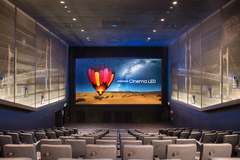
MUNICH/LOS ANGELES – In an effort to present the best visuals in exhibition technology, Samsung has selected footage captured with ARRI ALEXA cameras for their new Onyx 4K cinema LED displays. By using an array of modular LED panels to replace cinema projectors, the Samsung Cinema LED displays offer a completely new format of a cinema screen to enhance movie experiences. The technology displays Ultra Contrast with true blacks, high dynamic range and P3 color with supreme accuracy. To showcase this advancement in film exhibition, Samsung chose the productions LIQUID SUNSHINE, shot on ALEXA Mini by Luo Pan, and FACE TO FACE, shot by Tom Faehrmann on newly released ALEXA LF cameras.
More details from Arri (http://www.arri.com):
ARRI’s Team Lead in Image Science, Harald Brendel comments: “The new Samsung Cinema screen impressed us with its HDR technology and remarkable rendition of images. Footage shot on the ARRI ALEXA LF camera are displayed with stunning effects. We are pleased Samsung has recognized ALEXA images as the highest quality to demonstrate their new displays.
Motion pictures shot with the ALEXA have been highly acclaimed. Since the camera’s release, Best Cinematography Oscar winners captured on ALEXA include BLADE RUNNER 2049, THE REVENANT, BIRDMAN (OR THE UNEXPECTED VIRTUE OF IGNORANCE), GRAVITY, LIFE OF PI and HUGO. ALEXA technology has also proven to deliver optimal images for High Dynamic Range viewing experiences.
“At Samsung, we strive to provide our customers with the highest quality products across industries, including film and production,” said Bill Mandel, Vice President, Industry Relations at Samsung Research America. “Choosing ARRI ALEXA for our new Onyx Cinema LED screens was a logical next step in our quest for delivering the best movie watching experience for consumers around the world.
”ARRI will also work with Samsung to provide technical support in prep, on-set, and post for productions that want to use the full capabilities of the Onyx Cinema screen. Samsung has already installed two screens in South Korea, and one each in Zurich, Bangkok, and Shanghai. The first U.S. theater to offer the technology will be in Los Angeles.


